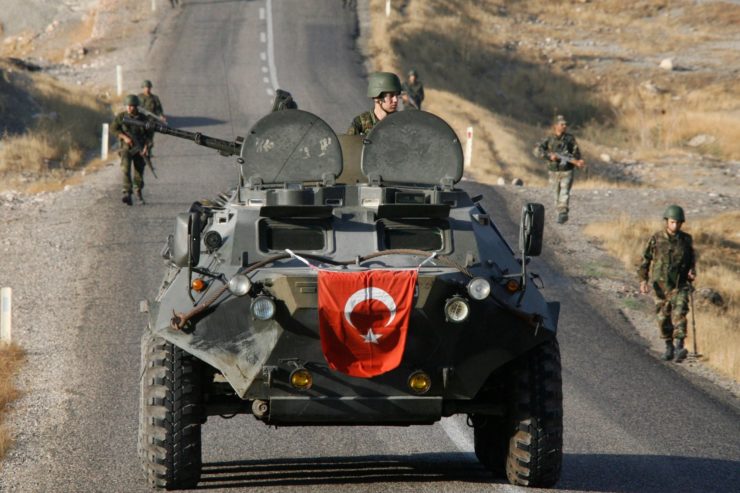
Kurds and Turkey have been at loggerheads since the inception of the country after the downfall of the Ottoman Empire. Kurds make up the largest minority of Turkey, as they comprise 1/5th of the nation’s 79 million population. Kurds have a total population of 30 million in different regions of the Middle East, mostly living in the bordering areas of Turkey, Iraq, Armenia, Iran, and Syria. They have been perennially attempting to gain an autonomous state comprising this border region. They hold a long history of persecution, political marginalization, and resistance. However, they have always been denied the autonomy from all the states. At the core of the conflict between the Kurds and Turkey, lies the former’s aspirations of establishing an autonomous Kurdish state. Although the Kurds played a crucial role in Turkey’s War of Independence (1919-1923), their aspirations of separation and autonomy were quashed violently by the Kemalist military. The extent of Turkey’s repression of Kurd ethnicity could be gauged by the fact that even the Kurdish language was proscribed in the country’s constitution until 1991. Moreover, all the Kurdish madrasas (religious institutions) and their religious orders were banned by the Kemalist establishment after World War 1 in order to secularize the country.
The government, during the rule of Kemal Atatürk, devised and pursued a strategy to coalesce them into the Turkish nation. But all such strategies turned out to be futile throughout the history of the country. But over time, the Kurd movement has gained momentum in the bordering regions of Iraq, Syria, and Turkey. The Kurds had been key allies of the US forces fighting against Saddam Hussein. This paved the way for an independent Kurdish region in Iraq in 2005. Kurds have always felt marginalized. They faced subjugation by the Turkish government due to its repressing policies against them. The Turkish government has also been accused of denying Kurds egalitarian opportunities and access to resources. This is also considered one of the major underlying causes behind the persistent Kurd separatist movement.
The conflict between the Turkish government and its Kurdish population also has some domestic dynamics. One of the major issues in the domestic dynamics is the identity factor of the Kurd minority of Turkey. The Turkish government attempted to forcefully suppress all the attempts made by the Kurds to showcase their identity. This resulted in the emergence of the Kurdistan Worker’s Party (PKK) along with increasing the grievances of the Kurd populace in Turkey.
In 2009, the government of Turkey, launched the “Kurdish opening initiative” to resolve the Kurdish issue, in which more than 40000 lives had been lost during 1985-2009, by addressing their grievances. However, this initiative became unsuccessful due to the surging resistance by the PKK. The Turkish government once again initiated a peace process in 2012 which also met the same fate as the previous one. The key reason behind the failure of this peace process was the commencement of war in Iraq and Syria. PKK gained rapid momentum due to the outbreak of this war. This instilled fear in the Turkish establishment about the sovereignty of the country and the impacts of PKK’s rising strength on the status quo. Consequently, both sides again turned to war in 2015, ending the ceasefire signed in 2013 as a result of this peace process.
Participation of the People’s Democratic Party, a pro-Kurdish political party, in the 2015 elections also resulted in a shift in Recep Tayyip Erdoğan’s approach to matters related to the Kurd minority. He has adopted a more militaristic and nationalistic approach towards this issue. The conflict between the Turkish armed forces and the Kurd militants has resulted in 6875 deaths, including 622 civilians, since 2015. Kurds had been key regional allies of the United States in the fight against the ISIS in Syria. However, the US decision to withdraw its forces from Syria in 2018 left the Kurds vulnerable to the Turkish military. The United States abandoned its former Kurd allies. Former US President Donald Trump defended this move. However, he also warned Turkey of serious consequences “if Turkey went too far.” This statement by Trump in itself was a sign of American loyalty to its friends.
Turkish forces and Kurdish militants have been fighting since 2015. The former is even conducting military operations inside Iraq and Syria’s border against the Kurd militants. The main reason behind these cross-border operations is that if the Kurds gained a stronghold in any of the neighboring countries, they would become more threatening to the sovereignty of Turkey. However, such cross-border operations are impinging the nation’s relations with the neighboring states. Kurd’s presence in the bordering areas of different countries has made the region vulnerable. Any development against the Kurd minority in any of the regional countries creates a direct impact on the whole Middle Eastern region. Turkey is also seeking to create a buffer zone along its border with Syria by resettling 1 million of its Syrian refugees in the region. The main rationale behind this is to inhibit the impacts of Syrian instability on Turkey.
Although Turkey holds significant military power, the Kurdish population across the Middle East could pose a serious threat to the country. Therefore, Turkey needs to formulate a multipronged, inclusive, and comprehensive strategy to cater to this issue. Grievances of the Kurd population must be addressed by the Turkish government. Poverty, deprivation, and marginalization often serve as the breeding ground for terrorism and extremism. Therefore, development in the Kurdish regions of the country and the provision of equal socio-economic opportunities could also help Turkey resolve this issue effectively.
Abbas Hashemite – is a political observer and research analyst for regional and global geopolitical issues. He is currently working as an independent researcher and journalist, exclusively for “New Eastern Outlook”.
